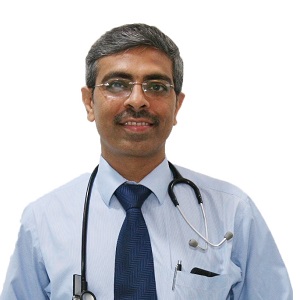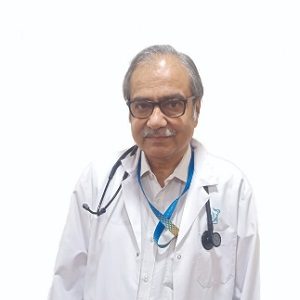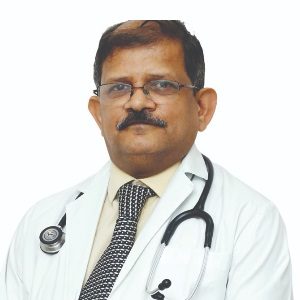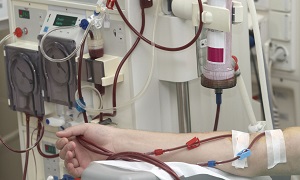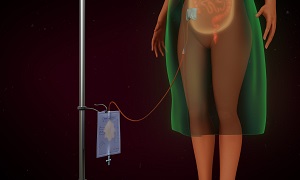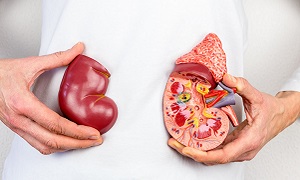Best Doctors in India for Chronic Kidney Disease Treatment
- Top Nephrologist | Apollo Hospital, New Delhi, India
- 20+ Years Experience
- Indraprastha Apollo Hospital, New Delhi
Profile Highlights:
- Dr. Gaurav Sagar is currently working as a consultant nephrologist at Apollo Indraprastha Hospital, New Delhi. He has over ten years of experience in renal medicine with a special interest in vascular access, kidney transplant, and critical care nephrology.
- Dr. Sagar has been a pioneer in practicing and promoting Interventional Nephrology in North India and was part of the team which conducted the first ABO-incompatible transplant in North India.
- Nephrologist, Chennai, India
- Over 43 years’ experience
- Apollo Hospitals Greams Road
Profile Highlights:
- Dr. Prakash K C is one of the senior Nephrologists from Tamil Nadu, with over 43 years of experience managing renal disorders.
- He provides consultation and a wide range of medical services like Ureteroscopy (URS), Kidney Transplant, Hemodialysis, etc. His team ensures a friendly environment for patients.
- Dr. Prakash is involved in many pieces of research and got his work published in periodicals and textbooks.
- Nephrologist, Chennai, India
- Over 29 years’ experience
- Apollo Hospitals Greams Road
Profile Highlights:
- Dr. B Subba Rao is one of the best Nephrologists in Tamil Nadu, with over 29 years of experience.
- Dr. Rao offers consultation and various services like Nephrolithotripsy, Hemodialysis, Hemodiafiltration (HDF), Percutaneous Nephrolithotripsy, CKD, Kidney Stone Treatment, Kidney Failure Treatment, etc.
- Dr. Subba Rao has been awarded the Vocational Excellence Award for his contributions to the field
- Nephrologist, Chennai, India
- Over 23 years’ experience
- Apollo Hospitals Greams Road
Profile Highlights:
- Dr. Rajeev Annigeri is a well-known Nephrologist from South India with 23 years of experience in the field of renal disorders treatment.
- He went under special training in Peritoneal Dialysis from the University of Missouri, USA.
- Dr. Annigeri ensures a fully supportive environment for the patients. The doctor provides many medical services like Adrenalectomy, Kidney Transplant, Hemodialysis, Kidney Surgery, Hemodialysis, etc.
- Nephrologist, Chennai, India
- Over 29 years’ experience
- Apollo Hospitals Greams Road
Profile Highlights:
- Dr. S Rajagopalan Seshadri is one of the best Nephrologists from Tamil Nadu, with over 29 years of experience.
- Dr. S Rajagopalan provides a wide range of medical services as a specialized Nephrologist/Renal Specialist.
- He is known for excellent patient care. Patients also visit Dr. Rajagopalan for other services like Proteinuria, Kidney Transplant, Hemodialysis, Nephrectomy, Percutaneous Nephrolithotripsy, CKD, Kidney Failure, etc.
- Nephrologist, Gurugram, India
- Over 20 years’ experience
- Manipal Hospitals, New Delhi
Profile Highlights:
- Dr. Suman Lata Nayak is one of Delhi’s most prominent Transplant physicians and was the founder of the Nephrology Department at the Institute of Liver and Biliary Sciences.
- Throughout her career, she has been actively involved in clinical research. Dr. Suman Lata Nayak’s research in the field of kidney transplantation, TB, and liver disease in patients, has made a significant impact on improving protocols in India.
Best Hospitals in India for Chronic Kidney Disease Treatment
Hospital Highlights:
- Apollo Hospitals is a private healthcare group in India, with its headquarters based in Chennai. Established in 1983 by Dr. Prathap C. Reddy, the group offers a wide range of medical treatments and services across various specialties.
- It is renowned for emphasizing innovation and utilizing cutting-edge medical technologies into patient treatment.
- Known as India’s first corporate hospital, Apollo Hospitals is often credited for pioneering the private healthcare revolution in the country.
- With clinics and hospitals located all throughout India, Apollo Hospitals is a nationwide healthcare organization. Its presence can also be found in foreign countries.
- Preventive health examinations, medical and surgical treatment, and diagnostic centres are just a few of the services that the Apollo group provides.
- The group has several centres of expertise, including Cardiac Sciences, Neurosciences, Orthopedics, Emergency Care, Cancer Care, and Organ Transplantation.
- City: Chennai, India
Hospital Highlights:
- RIMC is a multi-specialty hospital in a sprawling area of 36 acres located in Chromepet, Chennai, Tamil Nadu, India.
- The facility has 450 beds including 130 critical care beds, 9 operating rooms, modern reference laboratories and radiology services, and is conveniently located near road, rail and air transportation.
- RIMC is led and managed by world-renowned physicians committed to healthcare.
- RIMC offers the broadest range of clinical care, education, and research. The hospital offers state-of-the-art technology and modern treatment facilities designed to provide health care at an affordable cost.
- Rela Institute is driven by patient needs, comfort and confidence.
- City: New Delhi, India
Hospital Highlights:
- Fortis Hospital in Shalimar Bagh is a multi-super specialty hospital that strives to provide world-class patient care by leaving no stone unturned.
- Fortis, Shalimar Bagh, with 262 beds and a 7.34-acre footprint, provides the best level of medical care through its team of doctors, nurses, technicians, and management professionals.
- City: Bengaluru, India
Hospital Highlights:
- Established in 2007, the Apollo Hospitals Bangalore is a 300-bed multispecialty hospital situated in Bannerghatta Road, Bangalore.
- Equipped with the state-of-the-art technology, it is a leading hospital dedicated to providing healthcare needs to patients with compassion and expertise.
- It is the first hospital to have completed the highest number of Robot Assisted Heart Surgeries in India.
- Over the years, it has successfully conducted some of the rarest medical procedures such as spinal angiolipoma excision, autologous chondrocyte implantations, and tibial tuberosity shift with MPSL reconstruction.
- The Apollo Hospitals Bangalore has the reputation of performing the greatest series of airway stents in the country.
- Additionally, the hospital is known for providing comprehensive treatment in specialties such as gastroenterology, urology, gynecology, oncology, colorectal surgery, etc.
- The “The Minimal Access Surgery Centre” (MASC), one of Apollo Hospitals, Bangalore’s premier Centres of Excellence, is devoted to the use of minimally invasive surgical procedures.
- In 2013, THE WEEK-A C Nielsen, Best Hospital Survey ranked Apollo Hospitals Bangalore as the 2nd best multi-speciality hospital in Bangalore.
- City: Mumbai, India
Hospital Highlights:
- Gleneagles Global Hospital The 450-bed facility comprises of 17-stories, housing state-of-the-art infrastructure, and advanced medical care facilities.
- The hospital offers end-to-end clinical, surgical, and diagnostic services. It is equipped with a team of eminent medical professionals aided by qualified nurses and medical staff
- The Hospital offers advanced Endoscopic procedures, Hepatobiliary and Liver Surgeries, Surgical and Medical Gastroenterology, Bariatric Surgery, and Robotic surgery.
- The hospital is a center of excellence for Orthopedics, Joint Replacement, Knee Replacement, and Hip Replacement surgery.
- City: Hyderabad, India
Hospital Highlights:
- CARE Hospitals were established in the year 2000, by CARE Group.
- The multispecialty hospital has 435 beds, including 120 critical care beds, with an annual inflow of 180000 outpatients and 16,000 in-patients.
- The hospital provides specialty medical services in Cardiology, Cardiothoracic Surgery, Pediatric Cardiology, Pediatric Cardiothoracic Surgery, Neurology, Neurosurgery, Nephrology, and Urology.
- The hospital has the first dual source, 128 slice CT scanner (for high precision cardiac imaging) – the first of its kind in south India.
- The hospital offers a wide range of accommodation facilities for the convenience of its varied patient base, ranging from general wards to super deluxe rooms.
- City: Mumbai, India
Hospital Highlights:
- Fortis Hospital in Mulund is a 315-bed multi-speciality tertiary care hospital with five JCI accreditations that offers a wide variety of diagnostic and treatment services. The Fortis Hospital in Mulund delivers patient-centred treatment with cutting-edge technology, highly skilled and experienced surgeons, and paramedical staff.
- This institution houses Maharashtra’s largest multi-organ transplant centre. It is also the first heart transplant centre in western India to conduct 100 or more consecutive heart transplants in under four years. It is the only hospital in the city to have multi-organ transplants and has handled the youngest patient for angioplasty. Fortis Hospital Mulund now boasts the first advanced surgical robot in central Mumbai.
- Cardiology and heart surgery, urology, nephrology, neurosciences, orthopaedics, digestive care, emergency and critical care, and maternity care are among the services provided by the hospital.
- City: New Delhi, India
Hospital Highlights:
- Manipal Hospitals, Dwarka, is a super-specialty hospital in Dwarka, New Delhi, which is a part of Manipal Hospitals Group.
- The hospital aims to provide the best treatment on par with international standards at a fraction of the cost.
- Equipped with 380 beds, the hospital is also one of the new age hospitals which are equipped fully with state-of-the-art infrastructure, cutting-edge technology as well as the latest and advanced clinical practices. The hospital also has 13 modular Operation theatres with 118 beds which are solely meant for critical care.
- The hospital comprises internationally acclaimed doctors and highly professional and experienced hospital and medical staff who are able to provide preventive, therapeutic, and diagnostic services all under one roof.
- City: Chennai, India
Hospital Highlights:
- Located in Chennai, India, MGM Healthcare is a top multispecialty hospital that provides all medical services under one roof.
- Since its founding in 2019, MGM Healthcare has quickly become a leading national referral centre, creating several innovative flagship initiatives.
- MGM Healthcare combines next-generation medical and digital technologies to provide better patient results.
- With 12 centres of excellence, more than 400 inpatient beds, 100 intensive care unit beds, and 24/7 emergency care, MGM Healthcare leaves no chance in redefining the patient experience in Chennai.
- MGM Healthcare boasts 250+ expert doctors across 30+ departments, including Cardiology, Pulmonology, Neurology, Obstetrics & Gynaecology, and more.
- They house 12 specialized Centres of Excellence, including Neurosciences, Orthopaedics, and Multi-Organ Transplantation.
- Their team of doctors, nurses, and paramedics works together to give every patient individualized treatment.
Hospital Highlights:
- Lilavati Hospital & Research Centre is India’s premier multi-speciality tertiary care hospital and has been recognised as a global medical excellence centre.
- Lilavati Hospital & Research Centre has built an unrivalled level of trust with its patients over the years, thanks to a solid foundation that comprises cutting-edge facilities, the best medical competence, research, education, and charity endeavours.
- The hospital is quite proud of the fact that it now serves patients from all kinds of backgrounds, not just from the United States but from all around the world.
- The hospital has a total of 323 beds, one of the largest Intensive Care Units (ICUs), 12 Operation Theatres with modern amenities, over 300 consultants, and almost 1,800 personnel.
Chronic Kidney Disease
Chronic kidney disease is a slow and progressive loss of kidney function over several years, in which the person eventually develops permanent kidney failure.
Also known as chronic renal failure, chronic kidney disease, is more widespread than people think, since it mostly goes undetected, and undiagnosed until the disease is at an advanced stage. Sometimes, it is even discovered when the function of the kidneys is down to 25 percent of normal. As this condition advances, the function gets impaired severely, and dangerous levels of fluid and waste can build up in the body rapidly. Treatment is therefore aimed at slowing down or stopping the progression of the disease, and this is often done by controlling the underlying cause.
Symptoms
If kidney damage progresses, then signs and symptoms of chronic kidney disease develops over time slowly. Some of the signs and symptoms include:
- Nausea
- Fatigue and weakness
- Vomiting
- Changes in how much you urinate
- Loss of appetite
- Sleep problems
- Decreased mental sharpness
- Muscle twitches and cramps
- Swelling of feet and ankles
- Persistent itching
- High blood pressure that becomes difficult to control
- Chest pain, if there is a build-up of fluid, around the lining of the heart
- Shortness of breath, if fluid builds up in the lungs
Sometimes signs and symptoms of kidney disease might be nonspecific, which means that they may be caused by other illnesses as well. The kidneys are highly adaptable and are also able to compensate for lost function, and therefore signs and symptoms might not appear until irreversible damage has occurred. If you see these signs and symptoms, then make an appointment with your doctor.
Causes & risk factors
Diabetes and high blood pressure are considered to be the most two common causes of chronic kidney disease. They are generally responsible for over two-thirds of the cases.
Diabetes occurs when your blood sugar is too high and causes damage to various organs in your body, which includes the kidneys, heart as well as blood vessels.
High blood pressure, also known as hypertension occurs when the pressure of your blood against the walls of your blood vessels increases. If it is not controlled properly, it can lead to strokes, heart attacks, or chronic kidney disease. Chronic kidney disease can also be a cause of high blood pressure. Some other conditions are also there, which might lead to kidney disease, some of them including:
- Glomerulonephritis, a group of diseases that causes inflammation and damage to the filtering units of the kidneys. These disorders are known to be the third common type of chronic kidney disease.
- There are also inherited diseases, such as polycystic kidney disease, which can cause large cysts to form in the kidneys and damage the surrounding tissue.
- Malformations can also occur as a baby develops in its mother’s womb. For example, there might be a narrowing that prevents the normal outflow of urine and causes it to flow back up to the kidney. This can lead to infections and might even damage the kidneys.
- Obstructions which are caused by problems like kidney stones, tumors, or an enlarged prostate gland in men
- Lupus and other diseases that affect the immune system of the body
- Repeated urinary infections.
The list of risk factors that can increase your risk of developing chronic kidney disease include:
- Diabetes
- High blood pressure
- Heart and blood vessel (cardiovascular) disease
- Obesity
- Smoking
- Family history of kidney disease
- Having an abnormal kidney structure
- Older age
People of African-American, Native-American, or Asian-American ethnicity are generally more likely to have this condition.
Diagnosis
First, your doctor is going to discuss your personal and family history with you, and might also ask questions about whether you have been diagnosed with high blood pressure, or if you have taken any medicine that can affect the function of the kidneys. He/she will also likely ask if you have any family members having kidney disease and if you have seen any changes in your urinary habits.
Next, your doctor will need to perform a physical exam, and check for signs of problems with your heart or blood vessels, and will also conduct a neurological exam.
Some other tests and procedures might also be required, which include blood tests, imaging tests, urine tests, and a kidney biopsy.
Treatment
Medications
Although there is no current cure for chronic kidney disease, there are some therapies that can help control the signs and symptoms, as well as reduce the risk of complications.
Patients suffering from chronic kidney disease generally need to take a large number of medications, and different kinds of treatments. Some of these include:
Anemia Treatment– Hemoglobin is the substance in red blood cells that carry vital oxygen around your body. When this hemoglobin becomes low, the patient is known to have anemia. Therefore, some kidney patients might require blood transfusions. A patient with kidney disease might also require iron supplements, either in the form of daily ferrous sulfate tablets or in the form of injections.
Skin itching- Patients with chronic kidney disease can also suffer from skin itching problems. In such cases, Antihistamines, like chlorphenamine, can help in alleviating symptoms of itching.
Phosphate Balance– People having kidney disease might also not be able to eliminate phosphate properly from their bodies. If this occurs, patients are generally advised to reduce their nutritional phosphate intake, which means reducing the consumption of red meat, fish, eggs as well as dairy products.
High Blood Pressure- A common problem among patients with chronic kidney disease is high blood pressure. It is important to bring it down to protect the kidneys, in order to slow down the progression of the disease.
Anti-Sickness Medications– If toxins build up in the body, because of the kidneys not working properly, patients might feel sick. Therefore anti-sickness medications can help to relieve this sickness.
End-Stage Treatment
End-stage treatment is required when the kidneys are functioning at less than 10-15 percent of normal capacity, and measures such as diet, medications, and treatments are no longer able to manage the condition. Dialysis or kidney transplant is needed to survive.
Doctors generally try to delay the need for dialysis or kidney transplant, as long as they can, because they carry the risk of serious complications.
Kidney Dialysis
Kidney dialysis can be of several types. The two main types include the following-
Hemodialysis
Hemodialysis involves blood being pumped out of the body of the patient, and it goes through an artificial kidney which is called a dialyzer. The patient undergoes hemodialysis three times per week, and each session lasts for at least three hours.
According to experts, more frequent sessions generally result in a better quality of life for the patient, and with modern home-use dialysis machines, this is becoming more possible.
Peritoneal dialysis
In peritoneal dialysis, the blood is filtered in the own abdomen of the patient, in the peritoneal cavity, which contains a vast network of tiny blood vessels. A catheter is implanted into the abdomen, into which a dialysis solution is infused and drained out for as long as needed to remove the wastage and excess fluid.
Kidney Transplant
Complications
Almost every part of your body can get affected by chronic kidney disease, and some of the potential complications include:
- Fluid retention, which may lead to swelling in your arms and legs, or even high blood pressure, or fluid in your lungs, which is termed as pulmonary edema
- A sudden rise in the potassium levels in your blood, i.e. hyperkalemia. This can even impair your heart’s ability to function and might be even life-threatening
- Weak bones which can lead to an increased risk of bone fractures
- Heart and blood vessel (cardiovascular) disease
- Decreased sex drive, reduced fertility or erectile dysfunction
- Anemia
- Damage to the central nervous system, which can cause problems in concentrating, and might even lead to personality changes or seizures
- Pericarditis, an inflammation of the saclike membrane that envelops your heart
- Decreased immune response, which can make you more vulnerable to infection
- Pregnancy complications that carry risks for both the mother as well as the developing fetus
- Irreversible damage to both kidneys, which is known as end-stage kidney disease. This can require dialysis or even a kidney transplant
Prevention
Generally, diabetes and high blood pressure are the most common causes of chronic kidney disease. If you are having diabetes or high blood pressure, work with your doctor, and make efforts to keep it in control, to prevent kidney ailment.
Living a healthy lifestyle helps to prevent diabetes, high blood pressure, and kidney disease. You may follow these tips for lowering the risk of kidney disease, as well as the problems that cause it.
- Follow a low-salt and low-fat diet
- Have check-ups regularly with your doctor
- Exercise for a minimum of 30 minutes for at least five days a week
- Limit the use of alcohol
- Avoid smoking or tobacco use

